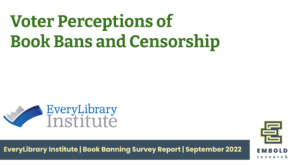EveryLibrary Institute Releases Survey Findings From Public Opinion Poll on Voter Perceptions of Book Bans and Censorship
In anticipation of Banned Books Week, the EveryLibrary Institute, a 501c3 organization dedicated to understanding public support for libraries, commissioned a public opinion poll of American voters in order to understand political support and opposition to book banning.
The EveryLibrary Institute survey found that the overwhelming majority of voters strongly opposes book banning and, most significantly, that 75 percent of voters will consider book bans when voting for legislators in November. “Voters believe in the right to read and the right to be left alone to make their own choices about what to read,” says John Chrastka, executive director of the EveryLibrary Institute.
This public opinion poll was conducted as part of the EveryLibrary Institute’s research agenda on understanding the political environment around book banning. Throughout the previous 18 months, the EveryLibrary Institute has tracked a significant shift in attempts to ban books in schools and public libraries. The EveryLibrary Institute partnered with Dr. Tasslyn Magnusson, an independent researcher who has been tracking the networks, organizations, and individual actors leading book banning and book challenge efforts in our nation’s school libraries and public libraries. Dr. Magnussen has tracked over 1,500 books that have been challenged or banned in schools and public libraries. Likewise, the EveryLibrary Institute has been tracking dozens of pieces of legislation across a growing number of states. These various pieces of legislation attempt to limit access to books in school and public libraries, require severe regulation of educational databases, control what books Americans are allowed to read, and even look to incarcerate or fine librarians under obscenity laws.
The poll was conducted by Embold Research, a nonpartisan research firm. Embold surveyed 1,123 registered voters from August 31st-September 3rd with a margin of error of 3.4%. The survey examined the differences in beliefs among voters segmented by age, gender, race/ethnicity, education, and 2020 presidential vote.
Some of the key findings include:
- Nearly all American voters (92%) have heard at least something about book banning.
- Half of voters believe there is “absolutely no time when a book should be banned,” 41% think “there are rare times when it’s appropriate to ban books,” and just 8% think “there are many books that are inappropriate and should be banned.”
- 31% of Republicans think there is absolutely no time when a book should be banned.
- 75% of voters will consider book banning when voting for legislators.
- 50% of Voters find the legislation created to regulate Americans’ access to books most concerning
- Voters have favorable feelings about their libraries (69%) and librarians (66%) and their schools (53%) and school librarians (62%).
- Only 18% of voters support banning books that focus on race and CRT, and only one-third support banning books that discuss sexuality.
In the past year EveryLibrary has seen a wave of new attacks on libraries and is working to directly address quite a few of them. Threats to librarians and their defense of free speech come in the wake of new attacks on educators across the country. Many librarians and educators are standing up to defend mainstream books that are the target of politically motivated challenges simply because they are written by authors of color, and/or present the experience or perspective of those from historically marginalized communities. Stories of the librarians and educators who are defending free speech and access to books can be seen on EveryLibrary’s page, “Stop Book Bans.”
It is clear from the polling results that voters appear to want to make their own choices about what to read and be free from attempts at government control, overreach, and legislative intervention. The survey shows that voters oppose banning books because of race, sexuality, and other content or viewpoint concerns. “It is heartening to see that this belief in the right to read – and voter support for school libraries and public libraries – transcend partisanship,” adds Chrastka. “With such high numbers of voters from all parties, persuasions, and backgrounds telling us that they support American’s right to read, it’s time for politicians to pay attention and stop their attacks on libraries.”
Resources
- Voter Perceptions of Book Bans and Censorship (13 Slides)
- Topline Findings
- Database of Book Bans and Challenges in the United States 2021 – 2022
Filed under: Associations and Organizations, Libraries, News, Public Libraries, School Libraries
About Gary Price
Gary Price (gprice@gmail.com) is a librarian, writer, consultant, and frequent conference speaker based in the Washington D.C. metro area. He earned his MLIS degree from Wayne State University in Detroit. Price has won several awards including the SLA Innovations in Technology Award and Alumnus of the Year from the Wayne St. University Library and Information Science Program. From 2006-2009 he was Director of Online Information Services at Ask.com.



